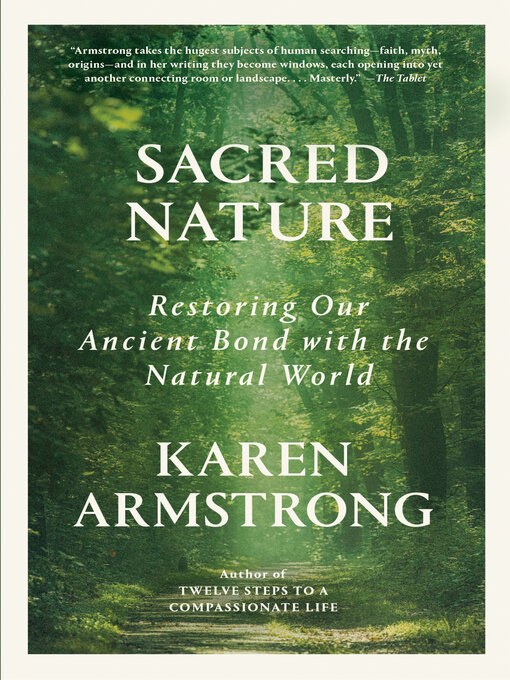"Much has been written on the scientific and technological aspects of climate change.... But Armstrong’s book is both more personal and more profound. Its urgent message is that hearts and minds need to change if we are to once more learn to revere our beautiful and fragile planet." —The Guardian
Since the beginning of time, humankind has looked upon nature and seen the divine. In the writings of the great thinkers across religions, the natural world inspires everything from fear, to awe, to tranquil contemplation; God, or however one defined the sublime, was present in everything. Yet today, even as we admire a tree or take in a striking landscape, we rarely see nature as sacred.
In this short but deeply powerful book, the best-selling historian of religion Karen Armstrong re-sacralizes nature for modern times. Drawing on her vast knowledge of the world’s religious traditions, she vividly describes nature’s central place in spirituality across the centuries. In bringing this age-old wisdom to life, Armstrong shows modern readers how to rediscover nature’s potency and form a connection to something greater than ourselves.
-
Creators
-
Publisher
-
Release date
September 6, 2022 -
Formats
-
Kindle Book
-
OverDrive Read
- ISBN: 9780593319444
-
EPUB ebook
- ISBN: 9780593319444
- File size: 1508 KB
-
-
Languages
- English
-
Reviews
-
Kirkus
August 1, 2022
The renowned scholar of comparative religions explores how we can use religion to meet global challenges. Armstrong taps into her encyclopedic knowledge to offer a way forward for a hurting world. Though the author primarily addresses environmental concerns, she delves deeper to investigate how the world's religions have treated the entirety of what is beyond the self. The author examines the ways in which faith traditions are grounded in an understanding and appreciation for the natural world, but the moral lessons involved are broader and more consequential. First, however, Armstrong seeks to convince readers to view nature through nonmodern eyes. "Unlike in our modern environmental discourse," she writes, "nature was presented and experienced imaginatively and aesthetically rather than scientifically, and this involved the emotions and the body." In numerous ancient cultures, religious ceremonies "not only expressed a deep anxiety about the sustainability of our world but made great demands on participants, who were expected not just to honor the divine in nature but also to reform themselves." Throughout the book, the author reminds readers of one of the fundamental differences between modern perceptions of nature as something separate and that of ancient cultures, which sought a close unity with the created world. Tying together dramatic creation tales, complex moral systems, and scriptural musings on the natural world, Armstrong argues for gratitude, mutual caregiving, and stewardship of resources, among other practices, to help bring us closer to our environment and, ultimately, to each other. "We simply need to recognize the sacrality of everything around us and observe how the myriad things tirelessly support one another," she writes. This concept of interconnectedness permeates many faith traditions as well as this text. While not one of Armstrong's most original or brilliant works, this book still is worth contemplating and discussing, and it serves as a fitting companion to the author's earlier work, Twelve Steps to a Compassionate Life. Thought-provoking wisdom regarding the natural world.COPYRIGHT(2022) Kirkus Reviews, ALL RIGHTS RESERVED.
-
Publisher's Weekly
September 12, 2022
Religion historian Armstrong (The Lost Art of Scripture) delivers a searching, spiritual take on climate change. Lamenting humanity’s alienation from nature, she contends that if humans are to survive a warming planet, “we have to change not only our lifestyle but our whole belief system.” To that end, she explores how a variety of faith traditions conceptualize humankind’s relationship with nature, observing that some pre-Christian cultures saw nature as “animate” and viewed humans as an integral part of it. Armstrong delves into Chinese religious traditions, noting that they have no creation stories and refrain from giving humans a privileged place in the world, unlike the Old Testament’s depiction of Adam as the master of creation. The ancient Indian religion of Jainism, she writes, holds that animals, plants, rocks, air, fire, and water all have souls and are entitled to the same courtesy and respect as people, and she encourages readers to embrace the faith’s “profound empathy” for one’s surroundings. The illuminating examinations of a broad array of religious traditions are thought-provoking and have the power to change the way readers see the world and humanity’s place within it. Eye-opening and wide-ranging, this original take on climate change edifies.
-
Formats
- Kindle Book
- OverDrive Read
- EPUB ebook
Languages
- English
Loading
Why is availability limited?
×Availability can change throughout the month based on the library's budget. You can still place a hold on the title, and your hold will be automatically filled as soon as the title is available again.
The Kindle Book format for this title is not supported on:
×Read-along ebook
×The OverDrive Read format of this ebook has professional narration that plays while you read in your browser. Learn more here.


